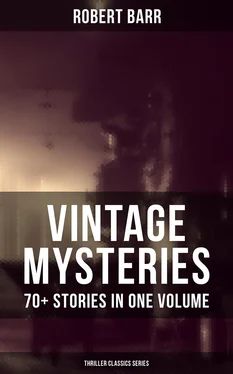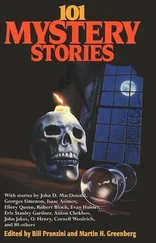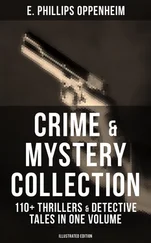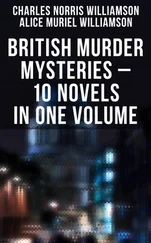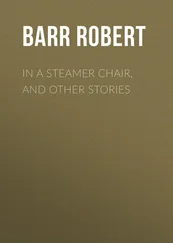I resumed my disguise, and told him I wished an innocent substitute for this picric bomb, and he at once suggested an earthenware globe, which would weigh the same as the bomb, and which could be coloured to resemble it exactly.
'And now, Monsieur Valmont, do you wish smoke to issue from this imitation bomb?'
'Yes,' I said, 'in such quantity as you can compress within it.'
'It is easily done,' he cried, with the enthusiasm of a true French artist. 'And may I place within some little design of my own which will astonish your friends the English, and delight my friends the French?'
'Monsieur,' said I, 'I am in your hands. I trust the project entirely to your skill,' and thus it came about that four days later I substituted the bogus globe for the real one, and, unseen, dropped the picric bomb from one of the bridges into the Seine.
On the morning of the procession I was compelled to allow Simard several drinks of absinthe to bring him up to a point where he could be depended on, otherwise his anxiety and determination to fling the bomb, his frenzy against all government, made it certain that he would betray both of us before the fateful moment came. My only fear was that I could not stop him drinking when once he began, but somehow our days of close companionship, loathsome as they were to me, seemed to have had the effect of building up again the influence I held over him in former days, and his yielding more or less to my wishes appeared to be quite unconscious on his part.
The procession was composed entirely of carriages, each containing four persons—two Englishmen sat on the back seats, with two Frenchmen in front of them. A thick crowd lined each side of the thoroughfare, cheering vociferously. Right into the middle of the procession Simard launched his bomb. There was no crash of explosion. The missile simply went to pieces as if it were an earthenware jar, and there arose a dense column of very white smoke. In the immediate vicinity the cheering stopped at once, and the sinister word 'bomb' passed from lip to lip in awed whispers. As the throwing had been unnoticed in the midst of the commotion, I held Simard firmly by the wrist, determined he should not draw attention to himself by his panic-stricken desire for immediate flight.
'Stand still, you fool!' I hissed into his ear and he obeyed trembling.
The pair of horses in front of which the bomb fell rose for a moment on their hind legs, and showed signs of bolting, but the coachman held them firmly, and uplifted his hand so that the procession behind him came to a momentary pause. No one in the carriages moved a muscle, then suddenly the tension was broken by a great and simultaneous cheer. Wondering at this I turned my eyes from the frightened horses to the column of pale smoke in front of us, and saw that in some manner it had resolved itself into a gigantic calla lily, pure white, while from the base of this sprung the lilies of France, delicately tinted. Of course, this could not have happened if there had been the least wind, but the air was so still that the vibration of the cheering caused the huge lily to tremble gently as it stood there marvellously poised; the lily of peace, surrounded by the lilies of France! That was the design, and if you ask me how it was done, I can only refer you to my pyrotechnist, and say that whatever a Frenchman attempts to do he will accomplish artistically.
And now these imperturbable English, who had been seated immobile when they thought a bomb was thrown, stood up in their carriages to get a better view of this aerial phenomenon, cheering and waving their hats. The lily gradually thinned and dissolved in little patches of cloud that floated away above our heads.
'I cannot stay here longer,' groaned Simard, quaking, his nerves, like himself, in rags. 'I see the ghosts of those I have killed floating around me.'
'Come on, then, but do not hurry.'
There was no difficulty in getting him to London, but it was absinthe, absinthe, all the way, and when we reached Charing Cross, I was compelled to help him, partly insensible, into a cab. I took him direct to Imperial Flats, and up into my own set of chambers, where I opened my strong room, and flung him inside to sleep off his intoxication, and subsist on bread and water when he became sober.
I attended that night a meeting of the anarchists, and detailed accurately the story of our escape from France. I knew we had been watched, and so skipped no detail. I reported that I had taken Simard directly to my compatriot's flat; to Eugène Valmont, the man who had given me employment, and who had promised to do what he could for Simard, beginning by trying to break him of the absinthe habit, as he was now a physical wreck through over-indulgence in that stimulant.
It was curious to note the discussion which took place a few nights afterwards regarding the failure of the picric bomb. Scientists among us said that the bomb had been made too long; that a chemical reaction had taken place which destroyed its power. A few superstitious ones saw a miracle in what had happened, and they forthwith left our organisation. Then again, things were made easier by the fact that the man who constructed the bomb, evidently terror-stricken at what he had done, disappeared the day before the procession, and has never since been heard of. The majority of the anarchists believed he had made a bogus bomb, and had fled to escape their vengeance rather than to evade the justice of the law.
Simard will need no purgatory in the next world. I kept him on bread and water for a month in my strong room, and at first he demanded absinthe with threats, then grovelled, begging and praying for it. After that a period of depression and despair ensued, but finally his naturally strong constitution conquered, and began to build itself up again. I took him from his prison one midnight, and gave him a bed in my Soho room, taking care in bringing him away that he would never recognise the place where he had been incarcerated. In my dealings with him I had always been that old man, Paul Ducharme. Next morning I said to him:—'You spoke of Eugène Valmont. I have learned that he lives in London, and I advise you to call upon him. Perhaps he can get you something to do.'
Simard was overjoyed, and two hours later, as Eugène Valmont, I received him in my flat, and made him my assistant on the spot. From that time forward, Paul Ducharme, language teacher, disappeared from the earth, and Simard abandoned his two A's—anarchy and absinthe.
The Clue of the Silver Spoons
Table of Contents
When the card was brought in to me, I looked upon it with some misgiving, for I scented a commercial transaction, and, although such cases are lucrative enough, nevertheless I, Eugène Valmont, formerly high in the service of the French Government, do not care to be connected with them. They usually pertain to sordid business affairs, presenting little that is of interest to a man who, in his time, has dealt with subtle questions of diplomacy upon which the welfare of nations sometimes turned.
The name of Bentham Gibbes is familiar to everyone, connected as it is with the much-advertised pickles, whose glaring announcements in crude crimson and green strike the eye throughout Great Britain, and shock the artistic sense wherever seen. Me! I have never tasted them, and shall not so long as a French restaurant remains open in London. But I doubt not they are as pronounced to the palate as their advertisement is distressing to the eye. If then, this gross pickle manufacturer expected me to track down those who were infringing upon the recipes for making his so-called sauces, chutneys, and the like, he would find himself mistaken, for I was now in a position to pick and choose my cases, and a case of pickles did not allure me. 'Beware of imitations,' said the advertisement; 'none genuine without a facsimile of the signature of Bentham Gibbes.' Ah, well, not for me were either the pickles or the tracking of imitators. A forged cheque! yes, if you like, but the forged signature of Mr. Gibbes on a pickle bottle was out of my line. Nevertheless, I said to Armand:—
Читать дальше
